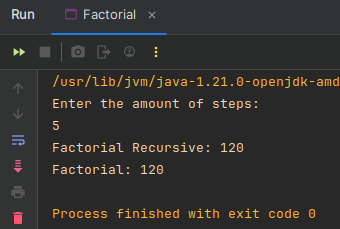Este código serve como uma exemplificação de duas maneiras distintas de obter o fatorial de um número qualquer: uma utilizando recursividade e outra de forma mais genérica com variáveis locais. Há também outras abordagens, como o uso de BigDecimal, já que o fatorial cresce muito rapidamente.
Método sem recursividade:
@Contract(pure = true)
private static long factorial(int n) {
long n1 = 1;
for (int i = 1; i <= n; i++) {
n1 *= i;
}
return n1;
}
Método recursivo + cache de memória:
@Contract(pure = true)
private static long factorialRecursive(int n) {
if (n <= 1) return 1;
if (cache.containsKey(n)) return cache.get(n);
long result = n * factorialRecursive(n - 1);
cache.put(n, result);
return result;
}
Projeto completo
package com.github.rickmvi.challenge04;
import com.github.rickmvi.jtoolbox.console.Out;
import com.github.rickmvi.jtoolbox.console.utils.ScannerUtils;
import org.jetbrains.annotations.Contract;
import java.util.HashMap;
import java.util.Map;
public class Factorial {
/**
* A static cache to store precomputed factorial values to optimize
* recursive calculations and prevent redundant computations during the
* execution of the factorialRecursive method.
* <p>
* The cache maps an integer (representing the input) to its corresponding
* factorial value as a long. It is used for memoization to improve performance
* by reducing the time complexity of repeated factorial calculations.
*/
private static final Map<Integer, Long> cache = new HashMap<>();
public static void main(String[] args) {
ScannerUtils.init();
Out.printLine("Enter the amount of steps: ");
int steps = ScannerUtils.nextInt();
Out.printFormatted("Factorial Recursive: {}%n", factorialRecursive(steps)); // Utilize cache/memoization
Out.printFormatted("Factorial: {}%n", factorial(steps));
ScannerUtils.close();
}
/**
* Calculates the factorial of a given non-negative integer using an iterative approach.
*
* @param n the non-negative integer for which the factorial is to be computed.
* Must be greater than or equal to 0.
* @return the factorial of the input number as a long. Returns 1 if the input is 0 or 1.
*/
@Contract(pure = true)
private static long factorial(int n) {
long n1 = 1;
for (int i = 1; i <= n; i++) {
n1 *= i;
}
return n1;
}
/**
* Calculates the factorial of a given non-negative integer using a recursive approach.
* This method uses memoization to optimize performance by storing previously
* computed results in a static cache.
*
* @param n the non-negative integer for which the factorial is to be computed.
* Must be greater than or equal to 0.
* @return the factorial of the input number as a long. Returns 1 if the input is 0 or 1.
*/
@Contract(pure = true)
private static long factorialRecursive(int n) {
if (n <= 1) return 1;
if (cache.containsKey(n)) return cache.get(n);
long result = n * factorialRecursive(n - 1);
cache.put(n, result);
return result;
}
}
Saida:
Espero que ajude alguém que tenha dúvida de como se faz, e dê um norte.



